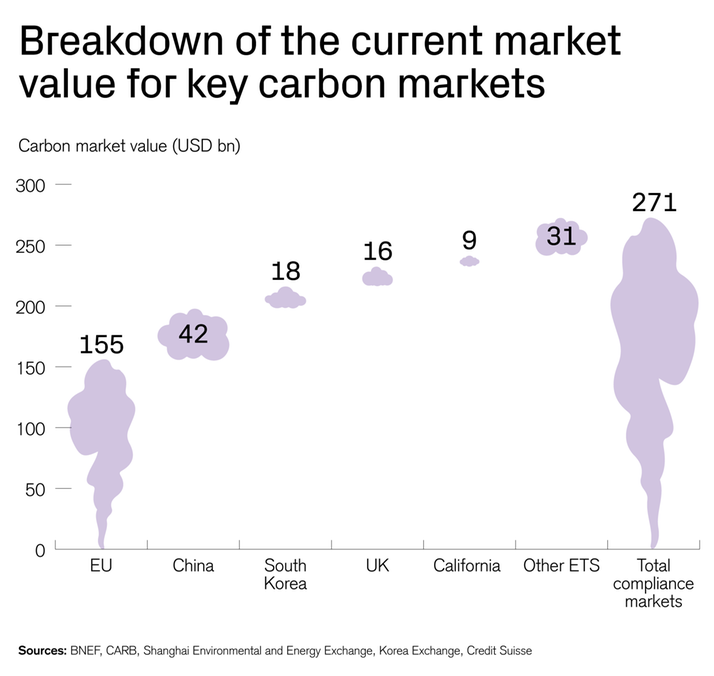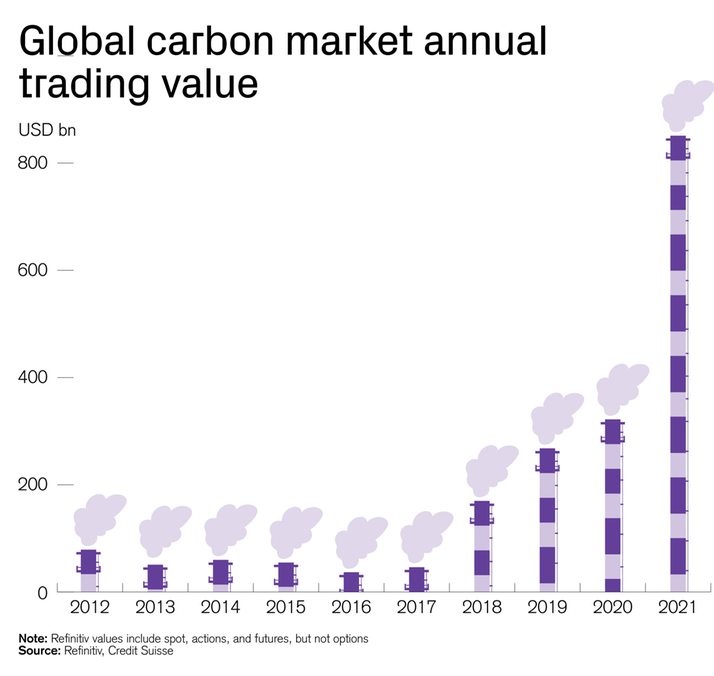Carbon is an emerging asset class that could potentially rival the global oil market in size
Carbon markets (together with carbon taxes) are a critical instrument in a broad toolkit to reduce greenhouse gas emissions and therefore climate change. The EU Emissions Trading System (ETS) is the world's largest and most liquid marketplace on which emission allowances are traded.

What are carbon markets?
Carbon markets are marketplaces through which emissions permits (allowances) and/or offsets can be exchanged between one entity and another. In compliance markets, such as EU ETS, governments set the supply of credits in order to achieve certain emission reduction outcomes (i.e. cap-and-trade). Regulated emitters can buy or sell allowances based on each entity's ability to reduce emissions and the resultant price should reflect the marginal cost of abatement for the entire market. In theory, this mechanism enables emission reductions to occur where they are easiest and least costly.
In voluntary carbon offset markets, companies and even individuals can buy offset credits (i.e. units representing emissions that have been reduced, avoided or sequestered) in order to meet their own carbon-neutral or other environmental claims. While today's carbon markets vary in size and objectives, all should serve to raise the explicit or implicit cost of carbon for governments, corporates, and consumers. Increasing participation from financial intermediaries and institutional investors should enable further growth in carbon markets.
The world needs higher carbon prices
In our view, the global weighted-average carbon price is still too low to incentivize tangible decarbonization activities. Carbon prices need to increase further to meet net-zero ambitions by 2050, according to the International Energy Agency. This also seems critical in advancing decarbonization technologies.

The value of carbon markets is near record highs as global climate actions gained unprecedented momentum in 2021. Carbon permits in the EU's ETS reached an all-time high of EUR 89 per metric ton in December, tripling the year-on-year levels and significantly outperforming equity indices.
Higher carbon prices are critical to providing economic signals for decarbonization.'
Such strong price actions across the world's three most liquid carbon markets put a spotlight on carbon as a barometer for global climate policy actions and as an emerging asset class.
Carbon as a new investment asset class
Clear steps forward on global climate actions combined with improvements in market size, accessibility, and liquidity are creating an environment that we believe is ripe for the emergence of big carbon markets.
This is concurrent with growing interest from the investment community to not only properly price carbon risks in their investment portfolios but also enhance their risk-adjusted returns.
Emergence of big carbon markets
Growth of big carbon markets is still in the early stages, and we view carbon markets as an emerging asset class that could potentially rival the global oil market in size.
Compliance carbon markets (i.e. market-driven ETS) and carbon taxes currently cover 22% of global greenhouse gas emissions. The global compliance carbon markets, on which carbon credits are traded and regulated by mandatory national/sub-national regimes, account for 75% of those total emissions covered and have an aggregate market value of approx. USD 270 billion.

We believe this figure could reach more than USD 1 trillion in the coming years driven by higher carbon prices and the expansion of emissions coverage, while the trading value could be multiples of that driven by improved accessibility and liquidity.
Implications for investors
Investor interest in carbon markets is growing rapidly, as carbon offsets can provide a solution to address the environmental friendliness of portfolios from an ESG perspective.
In our view, the "greenflation" risk is to the upside in the next three to five years driven by higher carbon and fossil fuel prices. Meanwhile, underinvestment in energy supply (both traditional and clean energy) could drive energy prices higher in the early stages of the transition.
In a carbon price shock, the initial impact will be felt more by energy consumers than by energy suppliers, which means carbon intensity is relevant for businesses across all parts of the economy. Conversely, higher carbon/energy cost should accelerate all decarbonization efforts, with renewables, hydrogen, carbon capture, and energy efficiency as the largest beneficiaries.
If 2021 was the year of net-zero goal setting, the focus going forward is squarely on implementation. The world today remains far from the trajectory of achieving net-zero emissions by 2050. However, as governments look to bridge the gap between climate actions and ambitions in the coming years, carbon markets should become an even more important legislative tool to incentivize real-world changes.
Investing with purpose
When Credit Suisse first launched the Supertrends in 2017, its objective was to identify multi-year societal trends that could lead to fast-growing business opportunities and enable investors to grow their capital. To access the latest Supertrends report, please visit our website.
2 topics

